I'd never heard of Healwell before and took a look over their offerings. Has anyone used the products? Beyond the…
News 5/17/13
Top News
The House Appropriations Committee approves $344 million in development funds for an integrated EHR for the VA and DoD, but mandates that no funds be expended on any EHR unless it is an open architecture system that serves both agencies.
From Stifler’s Mom: “Re: Marin General Hospital. Nurses warn that the new computer system is causing errors.” A dozen unionized Marin General nurses attend the healthcare district’s board meeting to ask hospital administration to put the McKesson Paragon implementation on hold, claiming orders are being entered on the wrong patients, patients have been given meds to which they are allergic, and discharges and surgical prep are taking two hours.
From Carolyn: “Re: first HIStalk Webinar with HTTS. Will the recording be made available for those of us who could not attend the live session?” The recorded Webinar, “Vendor Software Training: What Providers Should Demand” is available for anyone to view here and a PDF of the slides is here. Everyone who registered will get an e-mail with these links, along with those to the HTTS-developed forms mentioned in the presentation (the Software Vendor Training Checklist and Sample Evaluation Form.)
From Horizon Consultant: “Re: Bayhealth – Milford Memorial Hospital. Went live on Horizon Expert Orders full house with physicians this week, with few problems.”
From Acorn: “Re: Maine Medical problems. Their Epic project is over budget by some unidentified amount, but will be high 8-9 digits, more than member hospital boards signed up for. Rollouts that were expected to conclude in 2013 are on hold until Maine Medical Center is stabilized – 2015 maybe? MaineHealth’s mouthpiece said training was not an issue, but I respectfully disagree. Insufficient engagement at all levels and all phases has been at the root of problems.”
HIStalk Announcements and Requests
![]() This week’s highlights from HIStalk Practice include: the AMA looks at how patient-physician communication is affected by the use of computers in the exam room. INTEGRIS Health (OK) contracts with athenahealth for athenacollector and other products. Doctor office visits fell in 2012 while patients’ out-of-pocket costs jumped 30 percent. Primary care providers beat specialists in generating money for hospitals. The AMA does not recommend jumping directly from ICD-9 to ICD-11. Make the world a happier place (at least my world) and sign up for e-mail updates when you check out the HIStalk Practice news. Thanks for reading.
This week’s highlights from HIStalk Practice include: the AMA looks at how patient-physician communication is affected by the use of computers in the exam room. INTEGRIS Health (OK) contracts with athenahealth for athenacollector and other products. Doctor office visits fell in 2012 while patients’ out-of-pocket costs jumped 30 percent. Primary care providers beat specialists in generating money for hospitals. The AMA does not recommend jumping directly from ICD-9 to ICD-11. Make the world a happier place (at least my world) and sign up for e-mail updates when you check out the HIStalk Practice news. Thanks for reading.
Nuance CMIO Nick Terheyden tweets out another fun photo as he carries the HIStalk logo on his travels, this time with HIMSS President and CEO Steve Lieber from the stage of the Arkansas HIMSS Chapter meeting. Take along a printed logo or your iPad and snap and e-mail a photo from somewhere fun and I’ll run it here. We’ve seen photos from London and Dubai previously, so it’s your turn.
I’m behind on almost everything, so be patient if you are expecting something from me. I was so exhausted Wednesday night after work that I literally fell asleep in the middle of typing HIStalk, so I’m struggling to keep up.
On the Jobs Board: Clinical Analyst, Marketing Communication Specialist. Sponsors post their jobs for free.
Welcome to new HIStalk Platinum Sponsor, HCS (Health Care Software, Inc.) of Wall, NJ. Everybody likes stable vendors who aren’t just dabbling temporarily in healthcare, and HCS has been doing provider-only healthcare IT since 1969 (!!) The company’s INTERACTANT platform, an integrated suite of clinical and financial applications (revenue cycle, financials, EMR, mobile, and analysis) is meeting and exceeding the needs of all kinds of provider organizations (inpatient, outpatient, long term acute care, behavioral, and rehab). Check out their white papers (the best title: “Meaningful Use: Why Should Ineligible Providers Still Care?”) and case studies. Thanks to HCS for supporting HIStalk.
Acquisitions, Funding, Business, and Stock
The AMA reports a four percent decline in 2012 revenues from 2011, largely due to an 86 percent drop in advertising revenues and lower sales for printed coding books. Membership was up over three percent, but net operating profit fell 33 percent.
Sales
Port Huron Hospital (MI) signs a three-year contract with CareTech Solutions to use the iDoc Archive solution for storage of patient data as the hospital transitions to a new EHR.
Wilson Memorial Hospital (OH) chooses Access to integrate electronic patient signatures into Meditech and register patients electronically during downtime.
Trinitas Regional Medical Center (NJ) selects Dell’s Unified Clinical Archive solution to manage its clinical image archive.
The VA extends its contract with Authentidate for its Electronic House Call vital signs monitoring device and service and for the Interactive Voice Response System for remote patient monitoring.
People
MedeAnalytics names Andrew Hurd (Epocrates/Carefx) CEO, taking over for Mike Gallagher who will serve as executive chairman.
Jerry Baker (Halfpenny Technologies) joins HIT Application Solutions as president and CEO.
URAC appoints Kylanne Green (Inova Health System) president and CEO.
Streamline Health Solutions promotes Nicholas Meeks from VP of financial planning to SVP/CFO, taking over for the resigning Steve Murdock. Carolyn Zelnio (Aderant) also joins the company as VP/chief accounting officer.
Announcements and Implementations
HealthTech, parent company of HMS, MEDHOST, and Patient Logic, held a ribbon-cutting ceremony this past Wednesday to celebrate the opening of its new, larger headquarters in Franklin, TN. Participating were Allen Borden (assistant commissioner, Tennessee Department of Economic and Community Development); Rogers Anderson (Williamson County mayor); Ken Moore, MD (City of Franklin mayor); Matt Largen (president and CEO, Williamson County Chamber of Commerce); Bill Anderson (president and CEO, HealthTech); Steve Starkey (president, HMS); and Craig Herrod (president, MEDHOST).
Encore Health Resources launches its health analytics consulting practice, which follows the company’s preference of "Smart Skinny Data” (using information from specific sources to focus on specific analysis needed) over “Big Data.” The practice will offer analytics strategy, tools selection, implementation, performance improvement, and data governance help.
New York eHealth Collaborative issues an RFP to develop a statewide health portal, just after declaring Mana Health’s design to be the winner earlier this week.
Patient Updater releases a new version of its HIPAA-compliant messaging platform that allows hospitals to keep the families of surgery patients informed.
Government and Politics
The Senate confirms Marilyn Tavenner as CMS administrator, making her the first CMS leader to be confirmed in over nine years.
CMS will spend up to $1 billion for the second round of the Health Care Innovation Awards to promote projects that test new payment models in support of better care and lower costs.
Eleven top government officials will speak at the 2013 Health Privacy Summit, June 5-6 in Washington, DC, including Todd Park (White House), Joy Pritts (ONC), Leon Rodriguez (OCR/HHS), and David Muntz (ONC).
Massachusetts Governor Deval Patrick visits a digital health summit in Ireland to discuss collaboration between startup companies in their respective areas.
The wireless pill reminder bottle from AdhereTech wins the Healthcare Innovation World Cup.
Other
CareTech Solutions takes the top spot in a KLAS survey on IT outsourcing. Though many providers are pulling back on extensive IT outsourcing (EITO) in favor of partial IT outsourcing (PITO), EITO remains the most popular option for smaller hospitals.
The city government of Juneau, AK, which owns 57-bed Bartlett Regional Hospital, votes down an $8.5 million appropriation for a Cerner implementation the hospital has already signed for. The hospital CEO says the contract was signed before Quorum Health Resources left as facility managers and he’s not comfortable with the $1.155 million in annual maintenance costs on the $7.37 million capital purchase (15.7 percent per year). The hospital is hoping its contract has enough out clauses to convince Cerner to allow it to walk away as it seeks a less expensive system.
The deadline to submit proposals for educational content for HIMSS14 is June 3, or about 7 1/2 months before the actual conference. Interestingly, HIMSS suggests that proposed topics be “timely.” Interested speakers should consult their crystal balls before applying.
The federal government charges 89 people — including about 22 doctors, nurses, and other medical professionals in eight cities — with Medicare fraud schemes that totaled $223 million in false billings.
A New York medical practice exposes the personal information of thousands of its patients when a clerk mistakenly attaches an Excel worksheet to an e-mail being sent to 200 patients.
Weird News Andy offers a pithy headline for this story, “Time to eat cookies whilst on the rack,” but you’ll have to think to get it. British researchers find that body mass index (BMI) is a poorer predictor of life expectancy than the ratio of waist size to height. People with a ratio of 0.8, which would be 56-inch waist for a 5’10” man or woman, lived 17 years less on average, while keeping the ratio at 0.5 or less (a 35-inch waist in this example) was associated with reduced incidence of stroke, heart disease, and diabetes. The ratio works on children as young as five, the researchers say.
Sponsor Updates
- OB leaders at MedStar Franklin Square Medical Center (MD) describe PeriGen’s EHR, surveillance, and decision support system that supports healthier babies and mothers on “Today in America.”
- T-System posts a video explaining how its system benefits ED patients and clinicians.
- e-MDs will offer analytics and dashboards to its customers via an agreement with dashboardMD.
- ReadyDock adds Complete Tablet Solutions as a reseller of its tablet management products.
- This week’s 2013 Truven Health Advantage Conference in Scottsdale, AZ featured keynote addresses by Gov. Howard Dean, MD; Sen. Bill Frist, MD; and David Newman, MD.
- Prognosis Health Information Systems discusses key considerations when changing EHRs.
- SuccessEHS hosts a CEU-approved Webinar May 29 on ICD-10 changeover planning.
- The Boise Metro Chamber of Commerce recognizes Heathwise with its Healthcare Industry Excellence Award.
- Kareo posts a Webinar on the ins and outs of Stage 2 MU.
- Verisk Health hosts a May 29 Webinar featuring Bob Kay, senior data analyst with New Hampshire’s Granite Healthcare Network, who will discuss analytics for ACOs.
- Craneware offers Webinars May 22 and May 30 on best practices for improving financial performance.
- ChartWise Medical Systems CEO Jon Elion, MD discusses ethical practices in clinical documentation improvement on May 21 during the ACDIS Conference in Nashville.
- MedAssets customer Oconee Medical Center will share how it used the company’s technology and services to improve point-of-service collections at this week’s NAHAM conference in Atlanta.
- Finalists for Impact awards from the Technology Association of Georgia Southeastern Software Association include Billian’s HealthDATA (emerging mega trend and technology solutions provider) , McKesson (technology solutions provider), and NextGen (independent software vendor).
EPtalk by Dr. Jayne
From Big G: “Re: sick or not sick. I have a story to mirror yours. There I was, a medical student rotating at a large, urban children’s hospital’s ER. I was getting my duties from the charge nurse (‘Don’t touch anything.’) Without breaking stride, looking out at the vast, screaming waiting room, surely my vision of Hell, she pointed to one kid, and said, ‘He’s next.’ 30 years on, that display of sick/not sick sticks with me. Meningitis. Thanks for sharing. We’ve all had those semi-scary moments where we’re amazed by someone’s psychic abilities. Thank goodness for seasoned warriors in the trenches.”
During a recent “listening session” with CMS officials, the AMA offered testimony on the issue of cloned documentation. Comments on usability and reconsideration of Stage 2 MU were also hot topics in the discussion.
What is it with endorsements on LinkedIn lately? In recent weeks I’ve been “endorsed” for skill sets that I don’t remotely possess. If nothing else, it’s good for some entertainment, and some of it makes me sound just the slightest bit cool.
The National Committee for Quality Assurance (NCQA) publishes the names of 112 people newly certified as Patient Centered Medical Home experts. Those certification is aimed to help providers assess the quality of those offering to assist practices through the PCMH process. I hope they were all aware that their e-mail and snail mail addresses were going to be published to the world.
Speaking of certifications, I’m interested to hear who plans to sit for the American Board of Preventive Medicine subspecialty board exam in clinical informatics. The online application for initial certification is live and late fees apply to any application submitted after June 1. The exam is already fairly pricey and the Board will offer a non-fellowship pathway for the first few years. It will be interesting to see how presence or absence of certification impacts the job market for physician informaticists. Have you registered? What did you think? E-mail me.
Contacts
Mr. H, Inga, Dr. Jayne, Dr. Gregg, Lt. Dan, Dr. Travis.
More news: HIStalk Practice, HIStalk Connect.




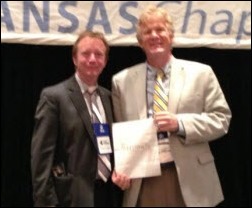
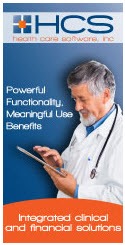


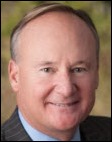
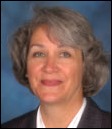

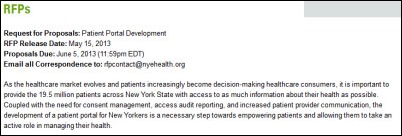
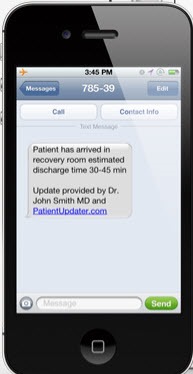
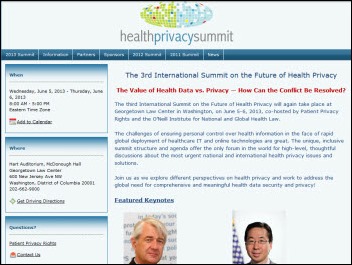

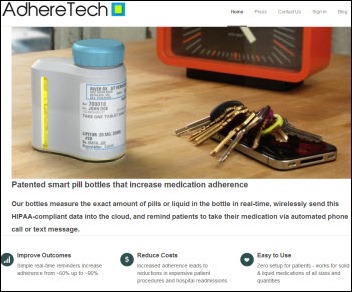
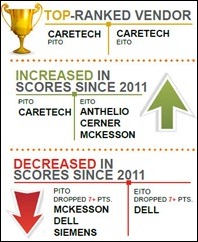


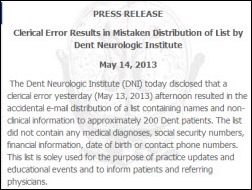


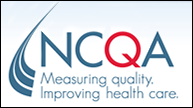


Re: sick or not sick. Big G – many of those seasoned warriors in the trenches are nurses that pave the way & keep green medical students & residents from making monumental mistakes.
RE: LinkedIn Endorsements.
I’ve been getting some of the same warrantless endorsements. Endorsements seem to have become a tool for meaningless cross-promotion and/or flattery, making it tough to identify who legitimately possesses relevant skills. LinkedIn should ask for some sort of identifying information as to why one person is endorsing another. Just a thought.
Unless I’m misunderstanding how the LinkedIn endorsements work, you can only be endorsed for Skills that you have selected to be added to your profile. And the endorsements can only be from first degree connections (people from whom you have accepted their Connection invitation).
So from LinkedIn’s perspective, these endorsements are from people you know (or you wouldn’t have accepted their invitation) of skills you said you had by adding them to your profile.
Endorsements… that’s an easy one. The skills for which they have the most endorsements are obviously the ones they actually possess! (sarcasm)
RE: Struggling to keep up….I for one appreciate everything you do and know I speak for all of your readers when I say “thank you!”
Re. Marin General.. They are an Xerox (formerly ACS) outsourced site. The Paragon CPOE product is relatively new. It’s hard to say how much of the problem is Nursing education, Paragon technology, or poor implementation and support. Xerox support is largely offshore.
I have endorsements for generic skills like “training” and “leadership” that I did not list as skills myself. I am not sure how they got there. Maybe someone thought I had such terrific training skills that they added it to my profile, but Im not that great at training so that seems unlikely. I am pretty sure what is actually happening is that LinkedIn is pushing endorsement recommendations to my connections. When I log in I often see “does so-and-so know about healthcare, project management, and public speaking? Endorse her skills” who knows if those skills are self selected by my connection or a product of some poorly designed LinkedIn algorithm.
I saw the “Pentagon Resists Administration’s Mandate For An Open Source Health Records System” news and “mandates that no funds be expended on any EHR unless it is an open architecture system that serves both agencies” news today, and it got me thinking about Open Source for regular (non-military) healthcare. The bills for purchasing commercial EHRs are astronomical; certainly hospitals are looking for a better way to do things in the future? And the arguments about which systems are “open” and which aren’t just highlight the fact that all EHRs are difficult to integrate with.
It seems that the open source EHRs available today aren’t up to task – maybe because of outdated technology (VistA) or lack of support (“Professional support can be bought from Hilbros – a German company providing services around GNUmed.” – http://www.gnumed.de). Not that old technology is necessarily bad – Epic is doing just fine – but using up-to-date technologies makes it easier to find people to work on your system.
It seems that if American hospital leadership were looking ahead 10 years, they would be looking for the next generation of EHR development rather than praying for vague “innovation.” Taking the lead in that next generation wouldn’t fix current implementation woes, but might prevent some issues next time around. Healthcare systems could come together and start a nonprofit foundation dedicated to creating that next generation of EHR. Considering the size of some of our hospital systems, the investment in that foundation would be relatively modest, and in return they would get:
1) a system based on modern technologies
2) a system whose code they can modify at will (imagine if you could do all your own code changes in-house)
3) a code base that receives contributions from many hospitals, so duplicating one hospital’s good idea is simplified (much less “they do this across town, why can’t we?”)
4) An open system (so they can connect any device they want, whether it’s EKG machines, medication dispensers, iPads for end users, etc)
5) A software company that is beholden to healthcare providers rather than to profits
6) Substantial customer support, either by the foundation or by third parties
I’m surprised that this isn’t already being widely considered. We’ve already seen that open source is ready for enterprise deployment (GNU/Linux) and can rapidly become excellent if there’s a strong driver pushing the development ahead (Android, Chrome). If hospitals want to improve their situation in a decade, it seems one promising strategy is to kick off their own open source project à la Android.
Re: Endorsements
This has been referenced on Wikipedia:
Skills
LinkedIn allows users to endorse each other’s skills. This feature also allows users to efficiently provide commentary on other users profiles – network building is reinforced. However there is no way of flagging anything other than positive content. Linkedin adopted “skill endorsement” in 2012, and in response to the arbitrary nature of those skill attributions, some LinkedIn participants began to list “Advanced Underwater Basket Weaving” [underwater basket weaving]as a skill, thereby exercising some control over their online profile.
are you seriously suggesting that every hospital modifying its source code is a good idea. Sounds like insanity.
Re: Sick or not sick: But is it good practice for those seasoned verteran ED Nurses to be allowed to place orders on patients and peform licensed physician duties just because the seasoned ED physicians trust them? Much credit to all ED employees for doing their jobs, but there had to be some adherence to the regulations, laws and liscensure requirements. Just a thought.
“In order for others to endorse your skills, you first need to add those skills to your profile.” http://www.socialmediaexaminer.com/linkedin-endorsements/
You can’t be endorsed for skills you did not add to your profile. So, people you know (first degree connections) are endorsing you for skills that you said you had.